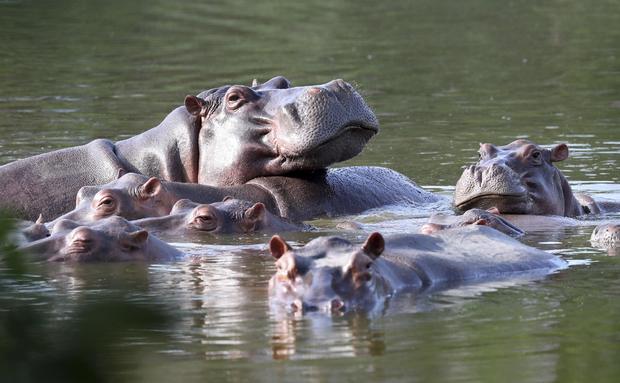Pablo Escobar's "cocaine hippos" won't stop multiplying. Colombia wants to move dozens of them out of the country.
Colombia is proposing transferring at least 70 hippopotamuses that live near Pablo Escobar's former ranch - descendants of four imported from Africa illegally by the late drug lord in the 1980s — to India and Mexico as part of a plan to control their population.
The so-called "cocaine hippos" — which weigh up to 3 tons — have spread far beyond the Hacienda Napoles ranch, located about 125 miles from Bogota along the Magdalena River. Environmental authorities estimate there are about 130 hippos in the area in Antioquia province and their population could reach 400 in eight years.
Escobar's Hacienda Napoles — and the hippos — have become a sort of local tourist attraction in the years since the kingpin was killed by police in 1993. When his ranch was abandoned, the hippos survived and reproduced in local rivers and favorable climatic conditions.

Scientists warn the hippos do not have a natural predator in Colombia and are a potential problem for biodiversity since their feces change the composition of the rivers and could impact the habitat of manatees and capybaras. Last year, Colombia's government declared them a toxic invasive species.
In 2021, after the Colombian government was sued over its plan to sterilize or kill the animals, a federal court ruled that the hippos can be recognized as people or "interested persons" with legal rights in the U.S. But the order doesn't carry any weight in Colombia where the hippos live, a legal expert said.
The area where they roam is a paradise for the animals who have no predators and ample food and water, CBS News correspondent Manuel Bojorquez reported in 2019. Locals call them the "village pets," but a local biologist told Bojorquez the "dangerous" and "territorial" species is anything but.
In Africa, hippos cause more human deaths than any other large animal. So far, there are no known attacks in Colombia. But David Echeverri, who works with the environmental agency in charge of tracking and managing the hippos in the region, told Bojorquez it's only a matter of time until someone gets hurt.
The plan to take them to India and Mexico has been forming for more than a year, said Lina Marcela de los Ríos Morales, director of animal protection and welfare at Antioquia's environment ministry.
The hippos would be lured with food into large, iron containers and transferred by truck to the international airport in the city of Rionegro, 150 kilometers away. From there, they would be flown to India and Mexico, where there are sanctuaries and zoos capable of taking in and caring for the animals.
"It is possible to do, we already have experience relocating hippos in zoos nationwide," said David Echeverri López, a spokesman for Cornare, the local environmental authority that would be in charge of the relocations.
The plan is to send 60 hippos to the Greens Zoological Rescue & Rehabilitation Kingdom in Gujarat, India, which De los Ríos Morales said would cover the cost of the containers and airlift. Another 10 hippos would go to zoos and sanctuaries in Mexico such as the Ostok, located in Sinaloa.
"We work with Ernesto Zazueta, who is the president of sanctuaries and zoos in Mexico, who is the one who liaisons with different countries and manage their rescues," said the official.
The plan is to focus on the hippos living in the rivers surrounding the Hacienda Napoles ranch, not the ones inside the ranch because they are in a controlled environment and don't threaten the local ecosystem.
The relocations would help control the hippo population, and though the animals' native habitat is Africa, it is more humane than the alternate proposal of exterminating them as an invasive species, said De los Ríos Morales.
Ecuador, the Philippines and Botswana have also expressed their willingness to relocated Colombian hippos to their countries, according to the Antioquia Governor's Office.
Last year, Alvaro Molina, 57, said he supports the so-called "cocaine hippos" -- even though he is one of the few Colombians to have been attacked by one. He was out fishing one day when he felt a movement beneath his canoe that spilled him into the water.
"The female attacked me once - the first pair that arrived - because she had recently given birth," he said.
Locals say the hippos sometimes come out of the water and walk through the streets of the town. When that happens, traffic stops and people keep out of their way.
- In:
- Pablo Escobar
Disclaimer: The copyright of this article belongs to the original author. Reposting this article is solely for the purpose of information dissemination and does not constitute any investment advice. If there is any infringement, please contact us immediately. We will make corrections or deletions as necessary. Thank you.







